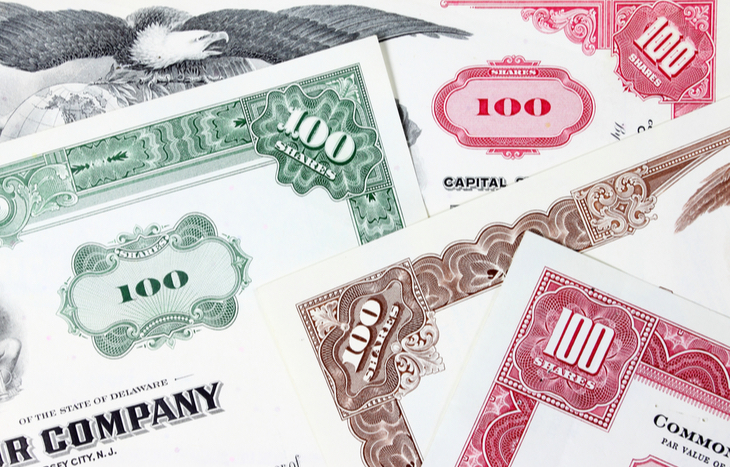What are Bearer Shares?
Today, when you buy stock in a company, you do so through a broker via a registered account. The process of buying and selling stock, and collecting dividends, is all documented. This means investors need to do very little outside of initiating the transaction. It wasn’t always this simple. In the days of bearer shares, transacting stock was a more involved process.
Bearer shares, like their cousins bearer bonds, are stock certificates that belong to whoever holds them. There’s no documentation associated with buying, selling or trading them other than the physical stock certificate itself. Unfortunately, without the ability to track and trace shares to registered owners, bearer shares open the door for all types of illicit activity.
These days, you won’t find bearer shares available for purchase outside of a select few places in the world. Nevertheless, it’s important to know the history of these shares and how they work.

How Bearer Shares Work
Bearer shares belong to whoever holds them, not who originally buys them. Because they’re unregistered, the only way to honor them is to acknowledge the holder as the owner.
When a company issues bearer shares, they print physical stock certificates, which are then exchanged for cash among prospective shareholders. They work just like common stock, only they’re unregistered and untraceable. When the open-market share price rises, the value of the bearer share rises. When the price falls, so does the value of the bearer share.
Bearer share holders are also entitled to any dividends the issuing company might pay. To redeem them, the stockholder must present the physical share certificate to receive the payment. As you might imagine, this becomes a tedious process, hence the shift to registered shares in recent years (and the convenience that comes with them).
The Shift Away From Bearer Shares
Bearer shares were once a common way for international companies to issue stock that was accessible to global investors. Before the era of digital trading, European companies could issue shares that traded among investors in America, for example. Participation on an exchange wasn’t necessary, since the shares were unregistered.
As digital trading became the mainstay, bearer shares fell out of favor. This is partially due to the convenience of digital registrars and partially due to the potential for illegal activity using untraceable shares. Today, unregistered securities are heavily restricted, if not outright banned. For example, in 2019, Switzerland cracked down on unregistered securities to all but outlaw them. In the United States, they’re subject to state-level laws and most states do not recognize them as valid shares.
Today, you’re unlikely to find bearer shares available for purchase. Even if you do come into possession of them, there are significant legal obstacles to capitalizing on them.
The Benefits
The only real benefit of bearer shares in today’s world is privacy. And often, privacy goes hand-in-hand with suspect activity. Because they’re untraceable, bearer share owners can handle their shares (and their value) however they’d like. Unfortunately, they’re often involved in nefarious activities, such as money laundering.
One real, legal example of bearer shares at work comes in the form of asset protection. Someone facing divorce or asset forfeiture may convert some of their wealth into untraceable shares to hide it. With no way to trace them, individuals can keep their shares hidden from legal proceedings to retain that wealth.
The Drawbacks
Despite the benefit of their anonymity, bearer shares come with many drawbacks. The biggest is the risk of loss. Without the paper stock certificate to signify it, there’s no way for the shareholder to prove ownership in the event someone steals the shares, or if they’re lost or damaged. For this reason, most investors keep them stowed away in a safety deposit box, which only compounds their inconvenience by making them inaccessible.
The other major drawback? In today’s modern age, these shares are almost exclusively used for illegal activity. While it’s not outright illegal to own or trade them, dealing in them will earn you a watchful eye from government authorities. This is because authorities have linked bearer shares to everything from terrorist funding, to tax evasion, to money laundering, human trafficking and even black-market sales of weapons.
Examples of Illicit Activities
Those buying or trading bearer shares do so at their own risk of investigation by global finance authorities and governments. Here’s a look at a few of the contributing events fueling the taboo nature of unregistered securities:
- In 2016, the Panama Papers scandal revealed how high-net-worth individuals around the world used bearer shares to conceal their wealth and evade taxes via 200,000+ entities.
- From 2009 to 2016, 1Malaysia Development Berhad, run by businessman Jho Low, laundered more than $4.5 billion into personal accounts using bearer shares.
- In 2021, an exposé on Swiss banking revealed massive money laundering during the COVID-19 pandemic, with much of it possible through bearer shares and bonds.
These examples represent the pinnacle of clandestine, illegal activity. Yet, they’re representative of the potential for bearer shares in shady dealings. It’s why they’re all but antiquated in today’s public markets.
Bearer Shares Belong to the Holder
The simplest thing to remember about bearer shares is that the holder is the owner. It doesn’t matter who purchased them. They’re unregistered, so the only way to prove ownership is through physical possession. Unfortunately, those in possession will likely face scrutiny, since modern-day uses of these unregistered securities tend to trend into illicit dealings. Given the option to buy bearer shares, most investors would be wise to decline, unless specifically recommended by a trustworthy financial authority for a specific, legal purpose.





